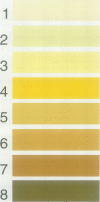Abstract
Objective:
To present recommendations to optimize the fluid-replacement practices of athletes.
Background:
Dehydration can compromise athletic performance and increase the risk of exertional heat injury. Athletes do not voluntarily drink sufficient water to prevent dehydration during physical activity. Drinking behavior can be modified by education, increasing accessibility, and optimizing palatability. However, excessive overdrinking should be avoided because it can also compromise physical performance and health. We provide practical recommendations regarding fluid replacement for athletes.
Recommendations:
Educate athletes regarding the risks of dehydration and overhydration on health and physical performance. Work with individual athletes to develop fluid-replacement practices that optimize hydration status before, during, and after competition.
Keywords: athletic performance, dehydration, heat illness, hydration protocol, hydration status, oral rehydration solution, rehydration
Full text
PDF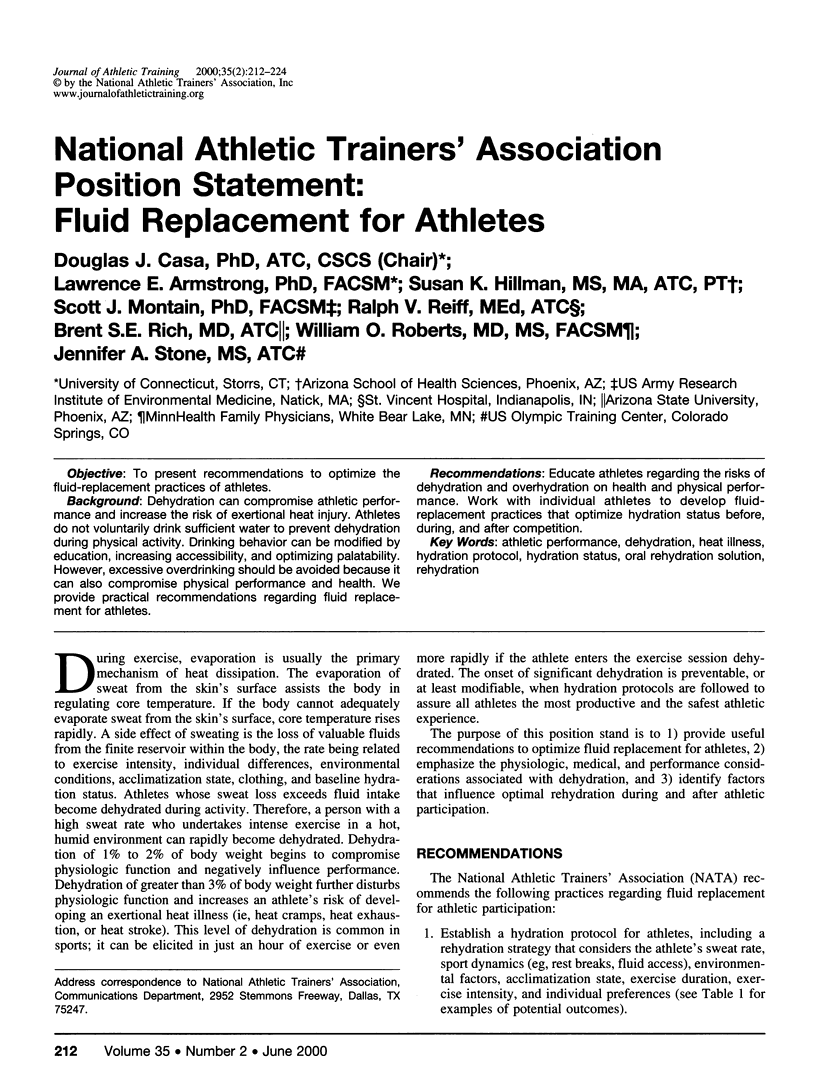
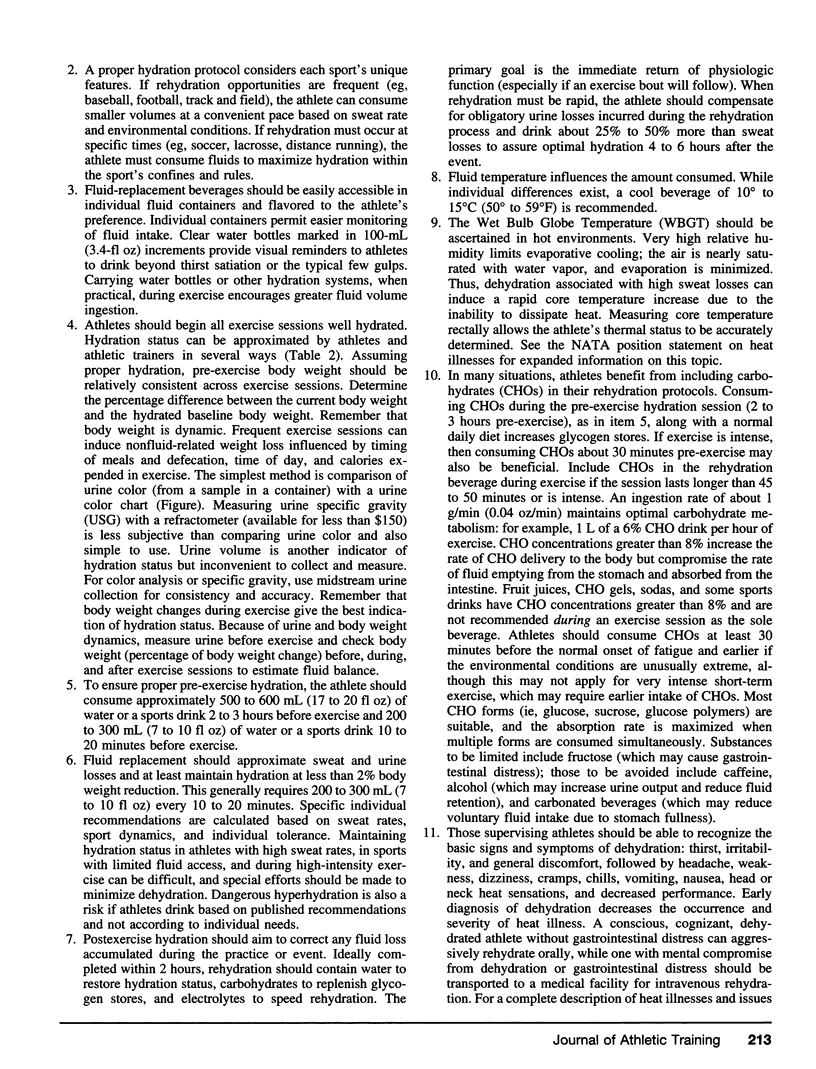
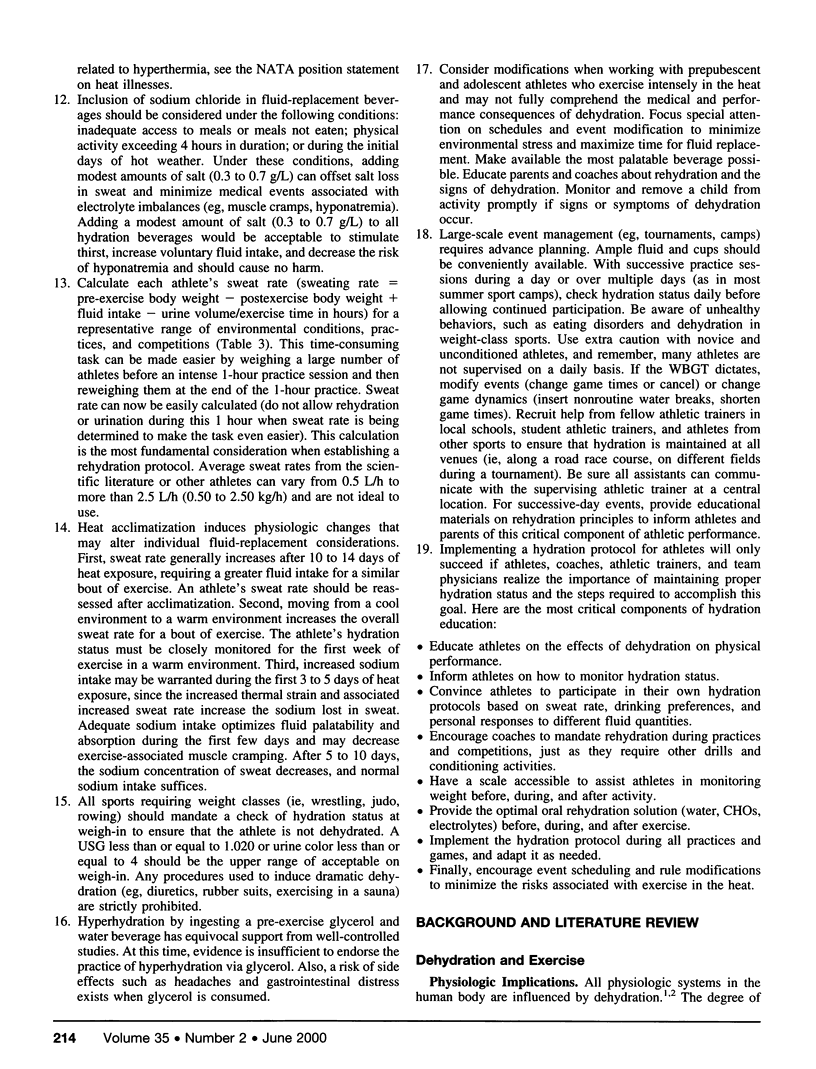
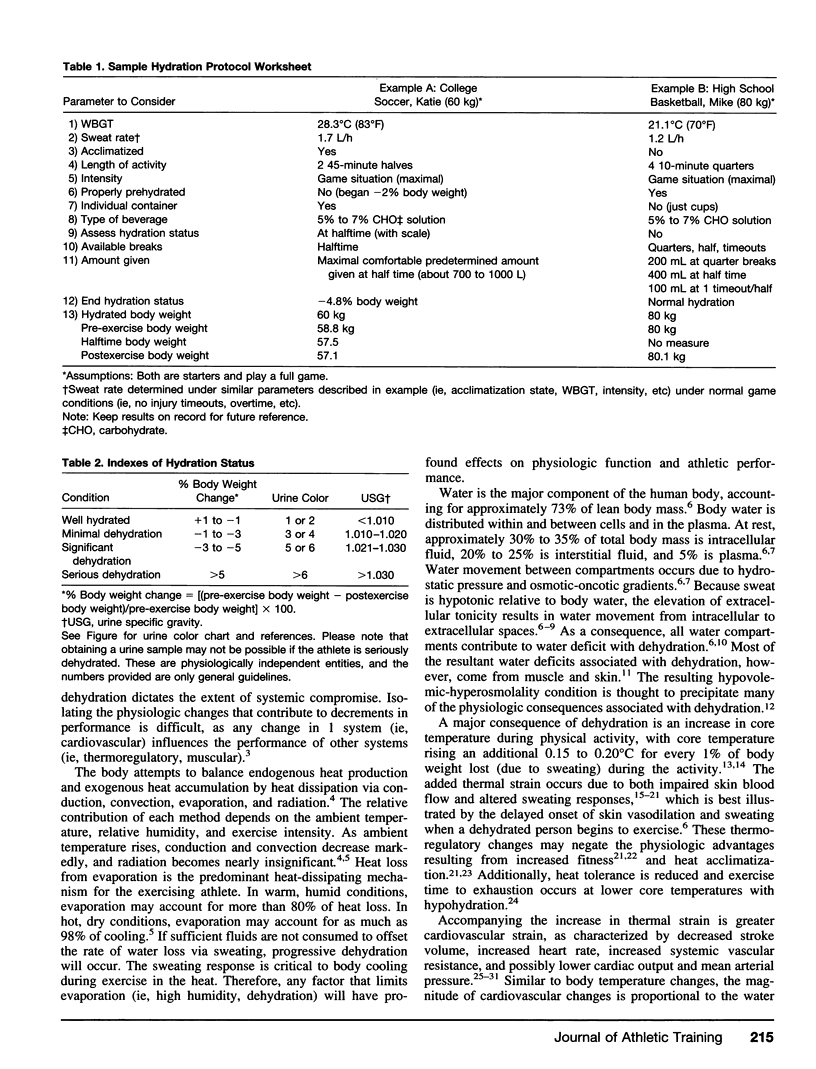
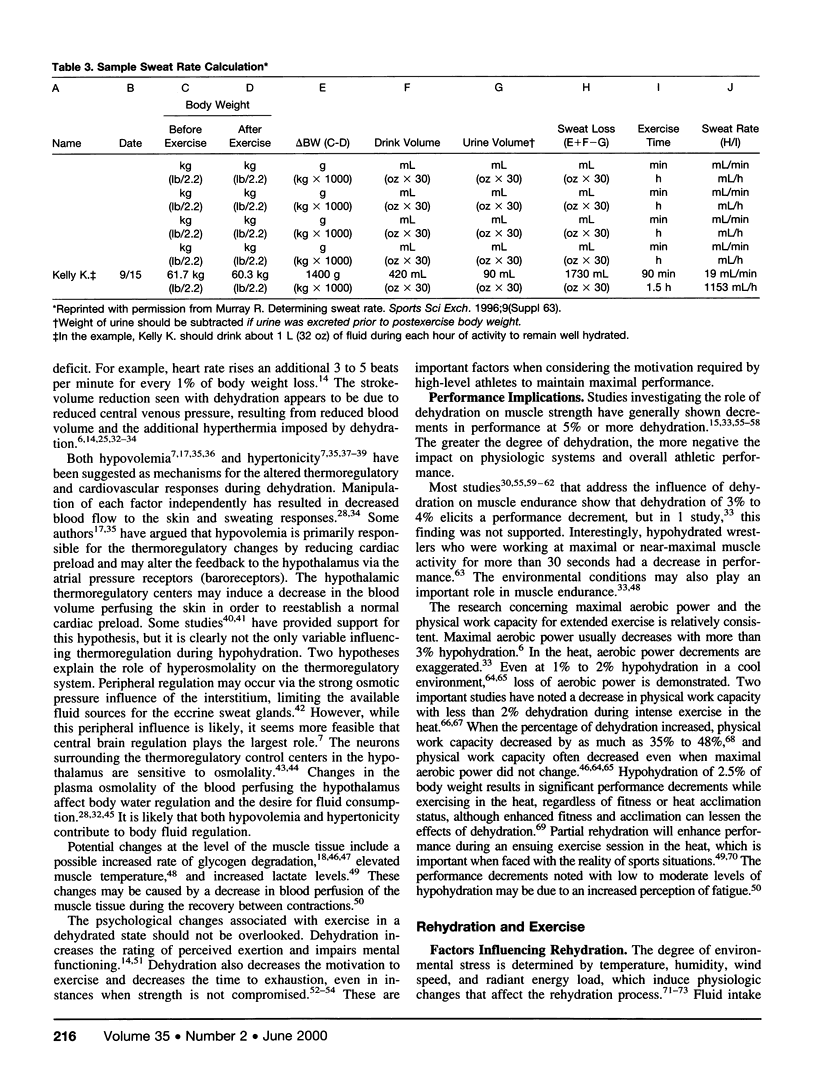
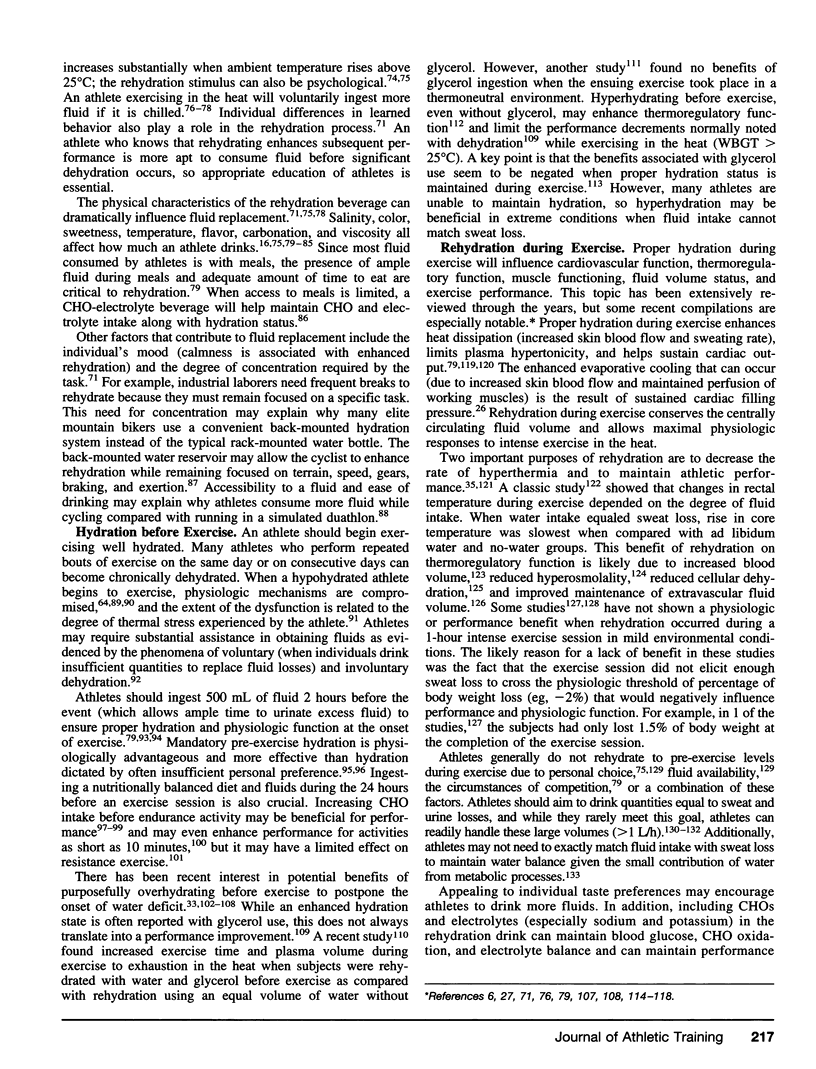
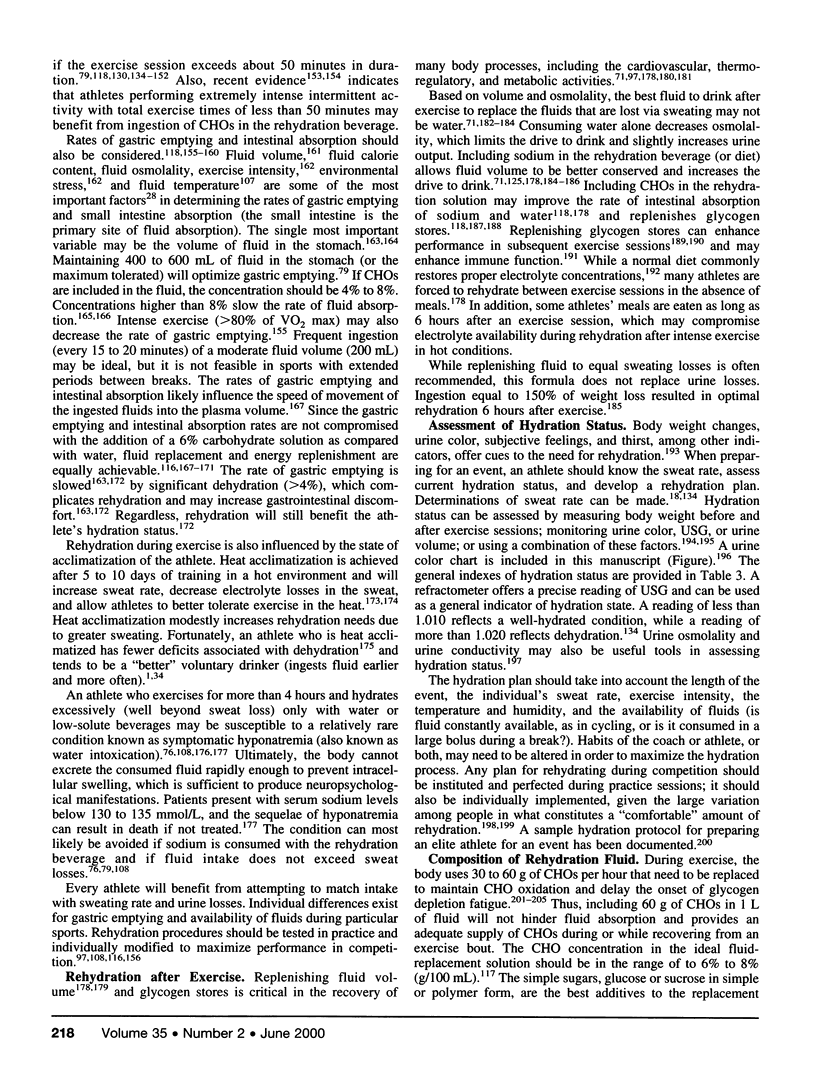
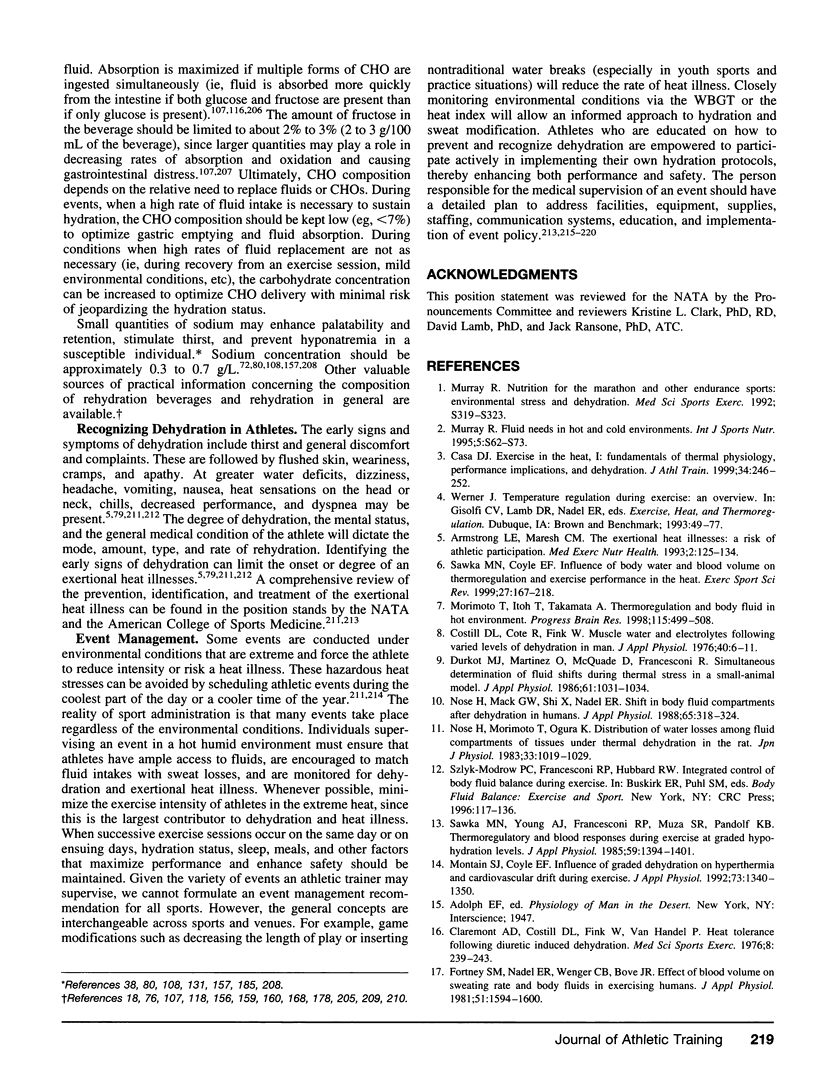
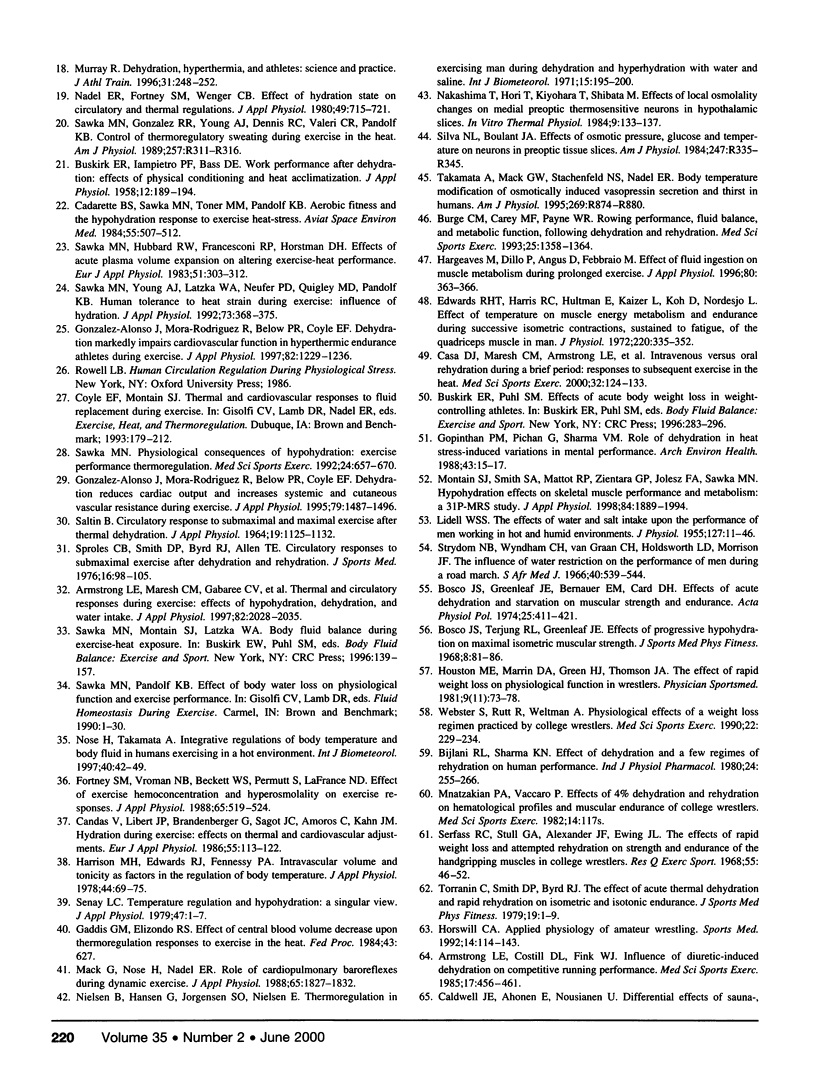
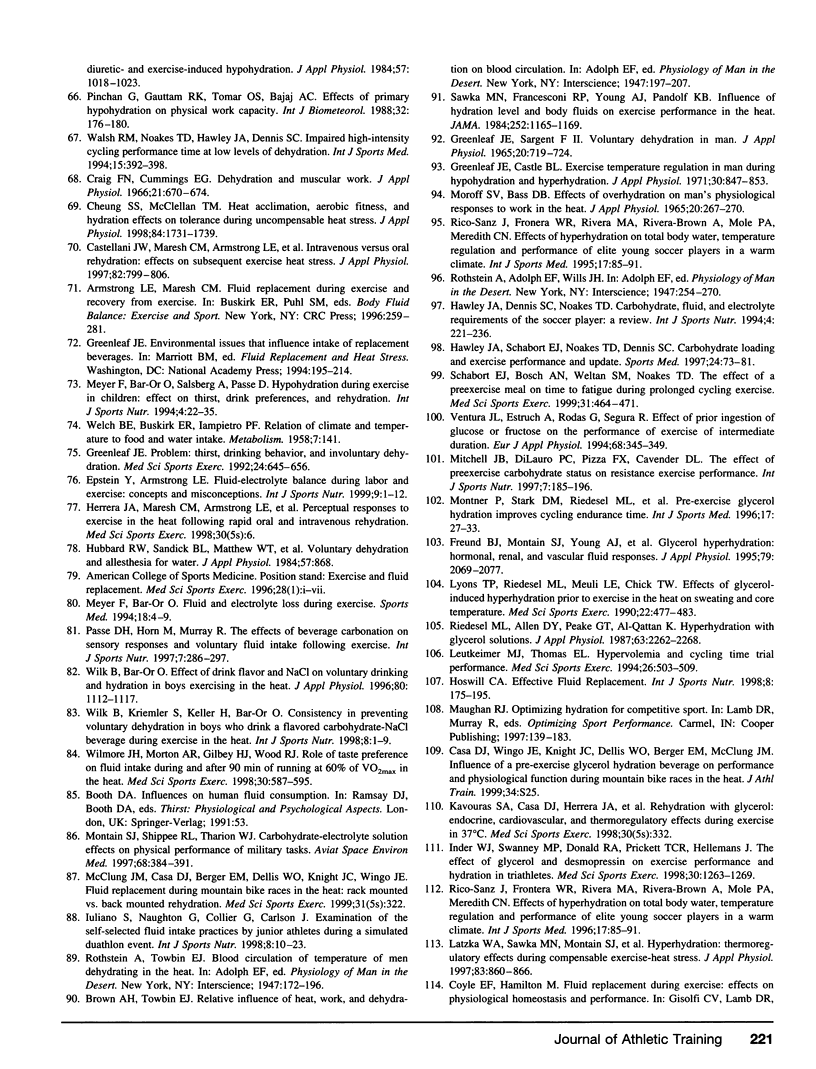
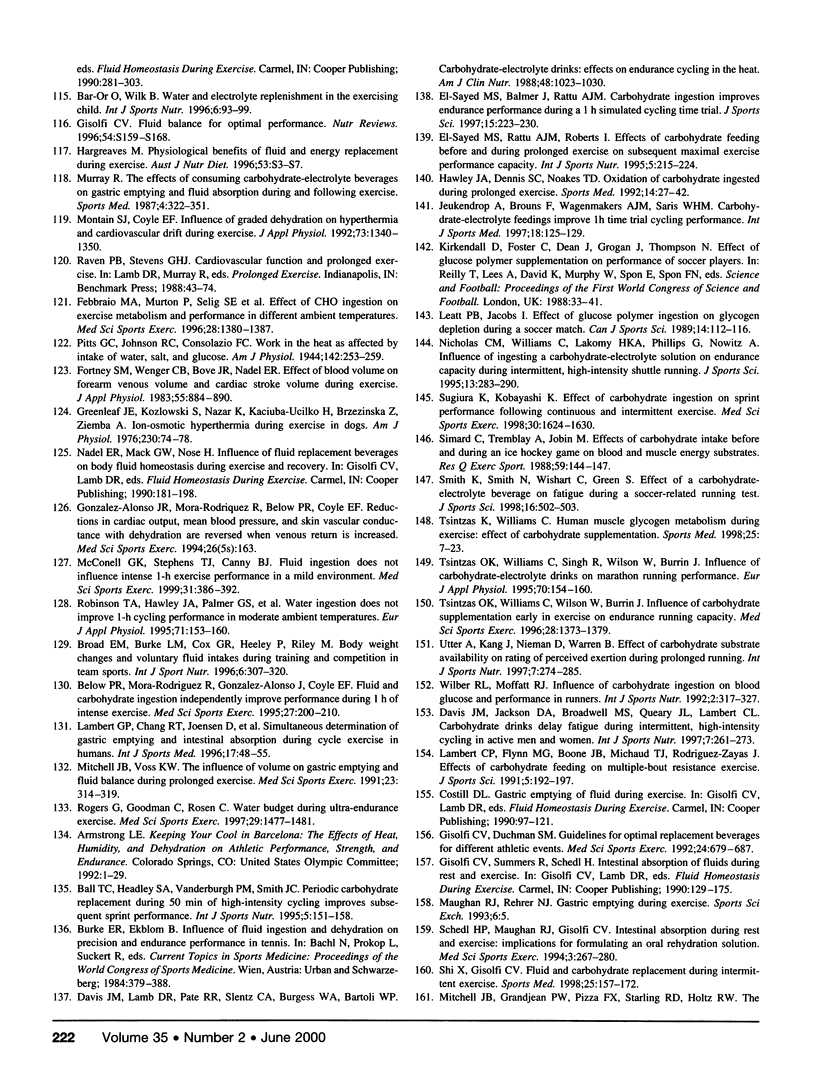
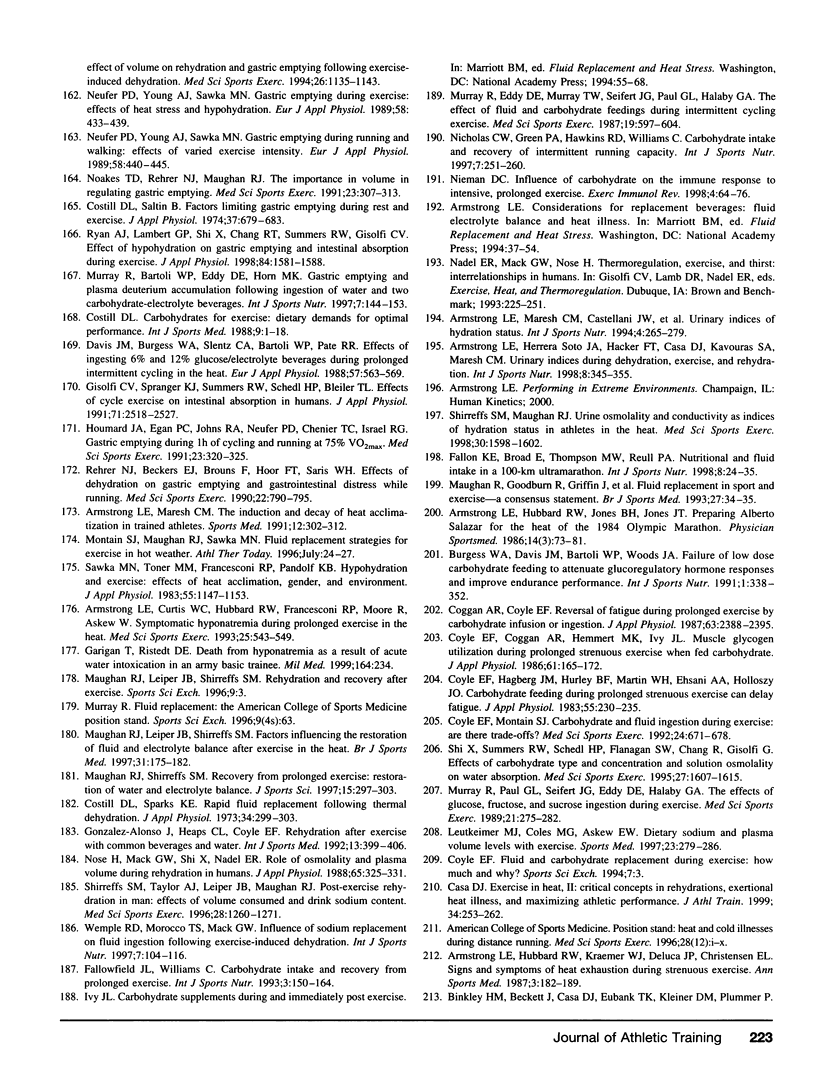
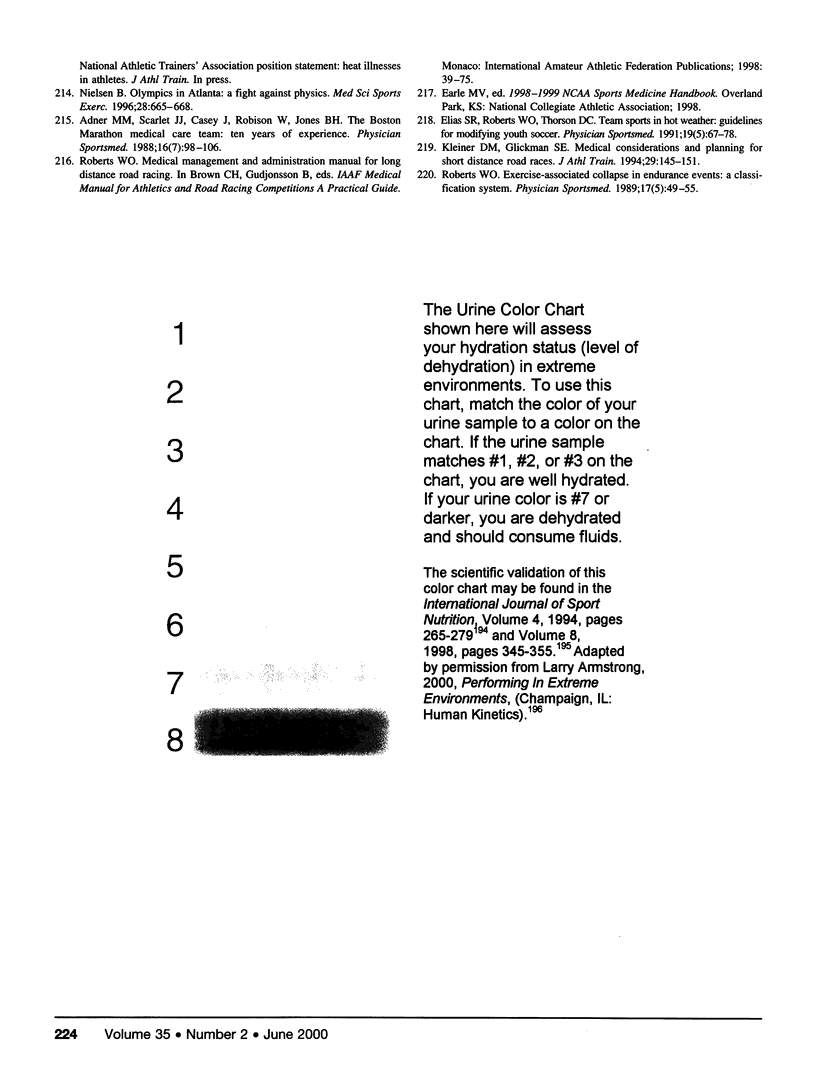
Images in this article
Selected References
These references are in PubMed. This may not be the complete list of references from this article.
- Armstrong L. E., Costill D. L., Fink W. J. Influence of diuretic-induced dehydration on competitive running performance. Med Sci Sports Exerc. 1985 Aug;17(4):456–461. doi: 10.1249/00005768-198508000-00009. [DOI] [PubMed] [Google Scholar]
- Armstrong L. E., Curtis W. C., Hubbard R. W., Francesconi R. P., Moore R., Askew E. W. Symptomatic hyponatremia during prolonged exercise in heat. Med Sci Sports Exerc. 1993 May;25(5):543–549. [PubMed] [Google Scholar]
- Armstrong L. E., Epstein Y. Fluid-electrolyte balance during labor and exercise: concepts and misconceptions. Int J Sport Nutr. 1999 Mar;9(1):1–12. doi: 10.1123/ijsn.9.1.1. [DOI] [PubMed] [Google Scholar]
- Armstrong L. E., Maresh C. M., Castellani J. W., Bergeron M. F., Kenefick R. W., LaGasse K. E., Riebe D. Urinary indices of hydration status. Int J Sport Nutr. 1994 Sep;4(3):265–279. doi: 10.1123/ijsn.4.3.265. [DOI] [PubMed] [Google Scholar]
- Armstrong L. E., Maresh C. M., Gabaree C. V., Hoffman J. R., Kavouras S. A., Kenefick R. W., Castellani J. W., Ahlquist L. E. Thermal and circulatory responses during exercise: effects of hypohydration, dehydration, and water intake. J Appl Physiol (1985) 1997 Jun;82(6):2028–2035. doi: 10.1152/jappl.1997.82.6.2028. [DOI] [PubMed] [Google Scholar]
- Armstrong L. E., Maresh C. M. The induction and decay of heat acclimatisation in trained athletes. Sports Med. 1991 Nov;12(5):302–312. doi: 10.2165/00007256-199112050-00003. [DOI] [PubMed] [Google Scholar]
- Armstrong L. E., Soto J. A., Hacker F. T., Jr, Casa D. J., Kavouras S. A., Maresh C. M. Urinary indices during dehydration, exercise, and rehydration. Int J Sport Nutr. 1998 Dec;8(4):345–355. doi: 10.1123/ijsn.8.4.345. [DOI] [PubMed] [Google Scholar]
- BUSKIRK E. R., IAMPIETRO P. F., BASS D. E. Work performance after dehydration: effects of physical conditioning and heat acclimatization. J Appl Physiol. 1958 Mar;12(2):189–194. doi: 10.1152/jappl.1958.12.2.189. [DOI] [PubMed] [Google Scholar]
- Ball T. C., Headley S. A., Vanderburgh P. M., Smith J. C. Periodic carbohydrate replacement during 50 min of high-intensity cycling improves subsequent sprint performance. Int J Sport Nutr. 1995 Jun;5(2):151–158. doi: 10.1123/ijsn.5.2.151. [DOI] [PubMed] [Google Scholar]
- Bar-Or O., Wilk B. Water and electrolyte replenishment in the exercising child. Int J Sport Nutr. 1996 Jun;6(2):93–99. doi: 10.1123/ijsn.6.2.93. [DOI] [PubMed] [Google Scholar]
- Below P. R., Mora-Rodríguez R., González-Alonso J., Coyle E. F. Fluid and carbohydrate ingestion independently improve performance during 1 h of intense exercise. Med Sci Sports Exerc. 1995 Feb;27(2):200–210. [PubMed] [Google Scholar]
- Bijlani R. L., Sharma K. N. Effect of dehydration and a few regimes of rehydration on human performance. Indian J Physiol Pharmacol. 1980 Oct-Dec;24(4):255–266. [PubMed] [Google Scholar]
- Bosco J. S., Greenleaf J. E., Bernauer E. M., Card D. H. Effects of acute dehydration and starvation on muscular strength and endurance. Acta Physiol Pol. 1974 Sep-Oct;25(5):411–421. [PubMed] [Google Scholar]
- Bosco J. S., Terjung R. L., Greenleaf J. E. Effects of progressive hypohydration on maximal isometric muscular strength. J Sports Med Phys Fitness. 1968 Jun;8(2):81–86. [PubMed] [Google Scholar]
- Broad E. M., Burke L. M., Cox G. R., Heeley P., Riley M. Body weight changes and voluntary fluid intakes during training and competition sessions in team sports. Int J Sport Nutr. 1996 Sep;6(3):307–320. doi: 10.1123/ijsn.6.3.307. [DOI] [PubMed] [Google Scholar]
- Burge C. M., Carey M. F., Payne W. R. Rowing performance, fluid balance, and metabolic function following dehydration and rehydration. Med Sci Sports Exerc. 1993 Dec;25(12):1358–1364. [PubMed] [Google Scholar]
- Burgess W. A., Davis J. M., Bartoli W. P., Woods J. A. Failure of low dose carbohydrate feeding to attenuate glucoregulatory hormone responses and improve endurance performance. Int J Sport Nutr. 1991 Dec;1(4):338–352. doi: 10.1123/ijsn.1.4.338. [DOI] [PubMed] [Google Scholar]
- Cadarette B. S., Sawka M. N., Toner M. M., Pandolf K. B. Aerobic fitness and the hypohydration response to exercise-heat stress. Aviat Space Environ Med. 1984 Jun;55(6):507–512. [PubMed] [Google Scholar]
- Caldwell J. E., Ahonen E., Nousiainen U. Differential effects of sauna-, diuretic-, and exercise-induced hypohydration. J Appl Physiol Respir Environ Exerc Physiol. 1984 Oct;57(4):1018–1023. doi: 10.1152/jappl.1984.57.4.1018. [DOI] [PubMed] [Google Scholar]
- Candas V., Libert J. P., Brandenberger G., Sagot J. C., Amoros C., Kahn J. M. Hydration during exercise. Effects on thermal and cardiovascular adjustments. Eur J Appl Physiol Occup Physiol. 1986;55(2):113–122. doi: 10.1007/BF00714992. [DOI] [PubMed] [Google Scholar]
- Casa D. J. Exercise in the Heat. II. Critical Concepts in Rehydration, Exertional Heat Illnesses, and Maximizing Athletic Performance. J Athl Train. 1999 Jul;34(3):253–262. [PMC free article] [PubMed] [Google Scholar]
- Casa D. J. Exercise in the heat. I. Fundamentals of thermal physiology, performance implications, and dehydration. J Athl Train. 1999 Jul;34(3):246–252. [PMC free article] [PubMed] [Google Scholar]
- Casa D. J., Maresh C. M., Armstrong L. E., Kavouras S. A., Herrera J. A., Hacker F. T., Jr, Keith N. R., Elliott T. A. Intravenous versus oral rehydration during a brief period: responses to subsequent exercise in the heat. Med Sci Sports Exerc. 2000 Jan;32(1):124–133. doi: 10.1097/00005768-200001000-00019. [DOI] [PubMed] [Google Scholar]
- Castellani J. W., Maresh C. M., Armstrong L. E., Kenefick R. W., Riebe D., Echegaray M., Casa D., Castracane V. D. Intravenous vs. oral rehydration: effects on subsequent exercise-heat stress. J Appl Physiol (1985) 1997 Mar;82(3):799–806. doi: 10.1152/jappl.1997.82.3.799. [DOI] [PubMed] [Google Scholar]
- Cheung S. S., McLellan T. M. Heat acclimation, aerobic fitness, and hydration effects on tolerance during uncompensable heat stress. J Appl Physiol (1985) 1998 May;84(5):1731–1739. doi: 10.1152/jappl.1998.84.5.1731. [DOI] [PubMed] [Google Scholar]
- Claremont A. D., Costill D. L., Fink W., Van Handel P. Heat tolerance following diuretic induced dehydration. Med Sci Sports. 1976 Winter;8(4):239–243. [PubMed] [Google Scholar]
- Coggan A. R., Coyle E. F. Reversal of fatigue during prolonged exercise by carbohydrate infusion or ingestion. J Appl Physiol (1985) 1987 Dec;63(6):2388–2395. doi: 10.1152/jappl.1987.63.6.2388. [DOI] [PubMed] [Google Scholar]
- Costill D. L. Carbohydrates for exercise: dietary demands for optimal performance. Int J Sports Med. 1988 Feb;9(1):1–18. doi: 10.1055/s-2007-1024971. [DOI] [PubMed] [Google Scholar]
- Costill D. L., Coté R., Fink W. Muscle water and electrolytes following varied levels of dehydration in man. J Appl Physiol. 1976 Jan;40(1):6–11. doi: 10.1152/jappl.1976.40.1.6. [DOI] [PubMed] [Google Scholar]
- Costill D. L., Saltin B. Factors limiting gastric emptying during rest and exercise. J Appl Physiol. 1974 Nov;37(5):679–683. doi: 10.1152/jappl.1974.37.5.679. [DOI] [PubMed] [Google Scholar]
- Costill D. L., Sparks K. E. Rapid fluid replacement following thermal dehydration. J Appl Physiol. 1973 Mar;34(3):299–303. doi: 10.1152/jappl.1973.34.3.299. [DOI] [PubMed] [Google Scholar]
- Coyle E. F., Coggan A. R., Hemmert M. K., Ivy J. L. Muscle glycogen utilization during prolonged strenuous exercise when fed carbohydrate. J Appl Physiol (1985) 1986 Jul;61(1):165–172. doi: 10.1152/jappl.1986.61.1.165. [DOI] [PubMed] [Google Scholar]
- Coyle E. F., Hagberg J. M., Hurley B. F., Martin W. H., Ehsani A. A., Holloszy J. O. Carbohydrate feeding during prolonged strenuous exercise can delay fatigue. J Appl Physiol Respir Environ Exerc Physiol. 1983 Jul;55(1 Pt 1):230–235. doi: 10.1152/jappl.1983.55.1.230. [DOI] [PubMed] [Google Scholar]
- Coyle E. F., Montain S. J. Carbohydrate and fluid ingestion during exercise: are there trade-offs? Med Sci Sports Exerc. 1992 Jun;24(6):671–678. [PubMed] [Google Scholar]
- Craig E. N., Cummings E. G. Dehydration and muscular work. J Appl Physiol. 1966 Mar;21(2):670–674. doi: 10.1152/jappl.1966.21.2.670. [DOI] [PubMed] [Google Scholar]
- Davis J. M., Burgess W. A., Slentz C. A., Bartoli W. P., Pate R. R. Effects of ingesting 6% and 12% glucose/electrolyte beverages during prolonged intermittent cycling in the heat. Eur J Appl Physiol Occup Physiol. 1988;57(5):563–569. doi: 10.1007/BF00418463. [DOI] [PubMed] [Google Scholar]
- Davis J. M., Jackson D. A., Broadwell M. S., Queary J. L., Lambert C. L. Carbohydrate drinks delay fatigue during intermittent, high-intensity cycling in active men and women. Int J Sport Nutr. 1997 Dec;7(4):261–273. doi: 10.1123/ijsn.7.4.261. [DOI] [PubMed] [Google Scholar]
- Davis J. M., Lamb D. R., Pate R. R., Slentz C. A., Burgess W. A., Bartoli W. P. Carbohydrate-electrolyte drinks: effects on endurance cycling in the heat. Am J Clin Nutr. 1988 Oct;48(4):1023–1030. doi: 10.1093/ajcn/48.4.1023. [DOI] [PubMed] [Google Scholar]
- Durkot M. J., Martinez O., Brooks-McQuade D., Francesconi R. Simultaneous determination of fluid shifts during thermal stress in a small-animal model. J Appl Physiol (1985) 1986 Sep;61(3):1031–1034. doi: 10.1152/jappl.1986.61.3.1031. [DOI] [PubMed] [Google Scholar]
- Edwards R. H., Harris R. C., Hultman E., Kaijser L., Koh D., Nordesjö L. O. Effect of temperature on muscle energy metabolism and endurance during successive isometric contractions, sustained to fatigue, of the quadriceps muscle in man. J Physiol. 1972 Jan;220(2):335–352. doi: 10.1113/jphysiol.1972.sp009710. [DOI] [PMC free article] [PubMed] [Google Scholar]
- Fallon K. E., Broad E., Thompson M. W., Reull P. A. Nutritional and fluid intake in a 100-km ultramarathon. Int J Sport Nutr. 1998 Mar;8(1):24–35. doi: 10.1123/ijsn.8.1.24. [DOI] [PubMed] [Google Scholar]
- Fallowfield J. L., Williams C. Carbohydrate intake and recovery from prolonged exercise. Int J Sport Nutr. 1993 Jun;3(2):150–164. doi: 10.1123/ijsn.3.2.150. [DOI] [PubMed] [Google Scholar]
- Febbraio M. A., Murton P., Selig S. E., Clark S. A., Lambert D. L., Angus D. J., Carey M. F. Effect of CHO ingestion on exercise metabolism and performance in different ambient temperatures. Med Sci Sports Exerc. 1996 Nov;28(11):1380–1387. doi: 10.1097/00005768-199611000-00006. [DOI] [PubMed] [Google Scholar]
- Fortney S. M., Nadel E. R., Wenger C. B., Bove J. R. Effect of blood volume on sweating rate and body fluids in exercising humans. J Appl Physiol Respir Environ Exerc Physiol. 1981 Dec;51(6):1594–1600. doi: 10.1152/jappl.1981.51.6.1594. [DOI] [PubMed] [Google Scholar]
- Fortney S. M., Vroman N. B., Beckett W. S., Permutt S., LaFrance N. D. Effect of exercise hemoconcentration and hyperosmolality on exercise responses. J Appl Physiol (1985) 1988 Aug;65(2):519–524. doi: 10.1152/jappl.1988.65.2.519. [DOI] [PubMed] [Google Scholar]
- Fortney S. M., Wenger C. B., Bove J. R., Nadel E. R. Effect of blood volume on forearm venous and cardiac stroke volume during exercise. J Appl Physiol Respir Environ Exerc Physiol. 1983 Sep;55(3):884–890. doi: 10.1152/jappl.1983.55.3.884. [DOI] [PubMed] [Google Scholar]
- Freund B. J., Montain S. J., Young A. J., Sawka M. N., DeLuca J. P., Pandolf K. B., Valeri C. R. Glycerol hyperhydration: hormonal, renal, and vascular fluid responses. J Appl Physiol (1985) 1995 Dec;79(6):2069–2077. doi: 10.1152/jappl.1995.79.6.2069. [DOI] [PubMed] [Google Scholar]
- Garigan T. P., Ristedt D. E. Death from hyponatremia as a result of acute water intoxication in an Army basic trainee. Mil Med. 1999 Mar;164(3):234–238. [PubMed] [Google Scholar]
- Gisolfi C. V., Duchman S. M. Guidelines for optimal replacement beverages for different athletic events. Med Sci Sports Exerc. 1992 Jun;24(6):679–687. [PubMed] [Google Scholar]
- Gisolfi C. V. Fluid balance for optimal performance. Nutr Rev. 1996 Apr;54(4 Pt 2):S159–S168. doi: 10.1111/j.1753-4887.1996.tb03912.x. [DOI] [PubMed] [Google Scholar]
- Gisolfi C. V., Spranger K. J., Summers R. W., Schedl H. P., Bleiler T. L. Effects of cycle exercise on intestinal absorption in humans. J Appl Physiol (1985) 1991 Dec;71(6):2518–2527. doi: 10.1152/jappl.1991.71.6.2518. [DOI] [PubMed] [Google Scholar]
- González-Alonso J., Heaps C. L., Coyle E. F. Rehydration after exercise with common beverages and water. Int J Sports Med. 1992 Jul;13(5):399–406. doi: 10.1055/s-2007-1021288. [DOI] [PubMed] [Google Scholar]
- González-Alonso J., Mora-Rodríguez R., Below P. R., Coyle E. F. Dehydration markedly impairs cardiovascular function in hyperthermic endurance athletes during exercise. J Appl Physiol (1985) 1997 Apr;82(4):1229–1236. doi: 10.1152/jappl.1997.82.4.1229. [DOI] [PubMed] [Google Scholar]
- González-Alonso J., Mora-Rodríguez R., Below P. R., Coyle E. F. Dehydration reduces cardiac output and increases systemic and cutaneous vascular resistance during exercise. J Appl Physiol (1985) 1995 Nov;79(5):1487–1496. doi: 10.1152/jappl.1995.79.5.1487. [DOI] [PubMed] [Google Scholar]
- Gopinathan P. M., Pichan G., Sharma V. M. Role of dehydration in heat stress-induced variations in mental performance. Arch Environ Health. 1988 Jan-Feb;43(1):15–17. doi: 10.1080/00039896.1988.9934367. [DOI] [PubMed] [Google Scholar]
- Greenleaf J. E., Castle B. L. Exercise temperature regulation in man during hypohydration and hyperhydration. J Appl Physiol. 1971 Jun;30(6):847–853. doi: 10.1152/jappl.1971.30.6.847. [DOI] [PubMed] [Google Scholar]
- Greenleaf J. E., Kolzowski S., Nazar K., Kaciuba-Uściłko H., Brzezińska Z., Ziemba A. Ion-osmotic hyperthermia during exercise in dogs. Am J Physiol. 1976 Jan;230(1):74–79. doi: 10.1152/ajplegacy.1976.230.1.74. [DOI] [PubMed] [Google Scholar]
- Greenleaf J. E. Problem: thirst, drinking behavior, and involuntary dehydration. Med Sci Sports Exerc. 1992 Jun;24(6):645–656. [PubMed] [Google Scholar]
- Greenleaf J. E., Sargent F., 2nd Voluntary dehydration in man. J Appl Physiol. 1965 Jul;20(4):719–724. doi: 10.1152/jappl.1965.20.4.719. [DOI] [PubMed] [Google Scholar]
- Hargreaves M., Dillo P., Angus D., Febbraio M. Effect of fluid ingestion on muscle metabolism during prolonged exercise. J Appl Physiol (1985) 1996 Jan;80(1):363–366. doi: 10.1152/jappl.1996.80.1.363. [DOI] [PubMed] [Google Scholar]
- Harrison M. H., Edwards R. J., Fennessy P. A. Intravascular volume and tonicity as factors in the regulation of body temperature. J Appl Physiol Respir Environ Exerc Physiol. 1978 Jan;44(1):69–75. doi: 10.1152/jappl.1978.44.1.69. [DOI] [PubMed] [Google Scholar]
- Hawley J. A., Dennis S. C., Noakes T. D. Carbohydrate, fluid, and electrolyte requirements of the soccer player: a review. Int J Sport Nutr. 1994 Sep;4(3):221–236. doi: 10.1123/ijsn.4.3.221. [DOI] [PubMed] [Google Scholar]
- Hawley J. A., Dennis S. C., Noakes T. D. Oxidation of carbohydrate ingested during prolonged endurance exercise. Sports Med. 1992 Jul;14(1):27–42. doi: 10.2165/00007256-199214010-00003. [DOI] [PubMed] [Google Scholar]
- Hawley J. A., Schabort E. J., Noakes T. D., Dennis S. C. Carbohydrate-loading and exercise performance. An update. Sports Med. 1997 Aug;24(2):73–81. doi: 10.2165/00007256-199724020-00001. [DOI] [PubMed] [Google Scholar]
- Horswill C. A. Applied physiology of amateur wrestling. Sports Med. 1992 Aug;14(2):114–143. doi: 10.2165/00007256-199214020-00004. [DOI] [PubMed] [Google Scholar]
- Houmard J. A., Egan P. C., Johns R. A., Neufer P. D., Chenier T. C., Israel R. G. Gastric emptying during 1 h of cycling and running at 75% VO2max. Med Sci Sports Exerc. 1991 Mar;23(3):320–325. [PubMed] [Google Scholar]
- Hubbard R. W., Sandick B. L., Matthew W. T., Francesconi R. P., Sampson J. B., Durkot M. J., Maller O., Engell D. B. Voluntary dehydration and alliesthesia for water. J Appl Physiol Respir Environ Exerc Physiol. 1984 Sep;57(3):868–873. doi: 10.1152/jappl.1984.57.3.868. [DOI] [PubMed] [Google Scholar]
- Inder W. J., Swanney M. P., Donald R. A., Prickett T. C., Hellemans J. The effect of glycerol and desmopressin on exercise performance and hydration in triathletes. Med Sci Sports Exerc. 1998 Aug;30(8):1263–1269. doi: 10.1097/00005768-199808000-00013. [DOI] [PubMed] [Google Scholar]
- Iuliano S., Naughton G., Collier G., Carlson J. Examination of the self-selected fluid intake practices by junior athletes during a simulated duathlon event. Int J Sport Nutr. 1998 Mar;8(1):10–23. doi: 10.1123/ijsn.8.1.10. [DOI] [PubMed] [Google Scholar]
- Jeukendrup A., Brouns F., Wagenmakers A. J., Saris W. H. Carbohydrate-electrolyte feedings improve 1 h time trial cycling performance. Int J Sports Med. 1997 Feb;18(2):125–129. doi: 10.1055/s-2007-972607. [DOI] [PubMed] [Google Scholar]
- Kleiner D. M., Glickman S. E. Medical considerations and planning for short distance road races. J Athl Train. 1994 Jun;29(2):145–151. [PMC free article] [PubMed] [Google Scholar]
- LADELL W. S. The effects of water and salt intake upon the performance of men working in hot and humid environments. J Physiol. 1955 Jan 28;127(1):11–46. doi: 10.1113/jphysiol.1955.sp005235. [DOI] [PMC free article] [PubMed] [Google Scholar]
- Lambert G. P., Chang R. T., Joensen D., Shi X., Summers R. W., Schedl H. P., Gisolfi C. V. Simultaneous determination of gastric emptying and intestinal absorption during cycle exercise in humans. Int J Sports Med. 1996 Jan;17(1):48–55. doi: 10.1055/s-2007-972807. [DOI] [PubMed] [Google Scholar]
- Latzka W. A., Sawka M. N., Montain S. J., Skrinar G. S., Fielding R. A., Matott R. P., Pandolf K. B. Hyperhydration: thermoregulatory effects during compensable exercise-heat stress. J Appl Physiol (1985) 1997 Sep;83(3):860–866. doi: 10.1152/jappl.1997.83.3.860. [DOI] [PubMed] [Google Scholar]
- Leatt P. B., Jacobs I. Effect of glucose polymer ingestion on glycogen depletion during a soccer match. Can J Sport Sci. 1989 Jun;14(2):112–116. [PubMed] [Google Scholar]
- Luetkemeier M. J., Coles M. G., Askew E. W. Dietary sodium and plasma volume levels with exercise. Sports Med. 1997 May;23(5):279–286. doi: 10.2165/00007256-199723050-00002. [DOI] [PubMed] [Google Scholar]
- Luetkemeier M. J., Thomas E. L. Hypervolemia and cycling time trial performance. Med Sci Sports Exerc. 1994 Apr;26(4):503–509. [PubMed] [Google Scholar]
- Lyons T. P., Riedesel M. L., Meuli L. E., Chick T. W. Effects of glycerol-induced hyperhydration prior to exercise in the heat on sweating and core temperature. Med Sci Sports Exerc. 1990 Aug;22(4):477–483. [PubMed] [Google Scholar]
- Mack G., Nose H., Nadel E. R. Role of cardiopulmonary baroreflexes during dynamic exercise. J Appl Physiol (1985) 1988 Oct;65(4):1827–1832. doi: 10.1152/jappl.1988.65.4.1827. [DOI] [PubMed] [Google Scholar]
- Maughan R. J., Goodburn R., Griffin J., Irani M., Kirwan J. P., Leiper J. B., MacLaren D. P., McLatchie G., Tsintsas K., Williams C. Fluid replacement in sport and exercise--a consensus statement. Br J Sports Med. 1993 Mar;27(1):34–35. doi: 10.1136/bjsm.27.1.34. [DOI] [PMC free article] [PubMed] [Google Scholar]
- Maughan R. J., Leiper J. B., Shirreffs S. M. Factors influencing the restoration of fluid and electrolyte balance after exercise in the heat. Br J Sports Med. 1997 Sep;31(3):175–182. doi: 10.1136/bjsm.31.3.175. [DOI] [PMC free article] [PubMed] [Google Scholar]
- Maughan R. J., Shirreffs S. M. Recovery from prolonged exercise: restoration of water and electrolyte balance. J Sports Sci. 1997 Jun;15(3):297–303. doi: 10.1080/026404197367308. [DOI] [PubMed] [Google Scholar]
- McConell G. K., Stephens T. J., Canny B. J. Fluid ingestion does not influence intense 1-h exercise performance in a mild environment. Med Sci Sports Exerc. 1999 Mar;31(3):386–392. doi: 10.1097/00005768-199903000-00006. [DOI] [PubMed] [Google Scholar]
- Meyer F., Bar-Or O. Fluid and electrolyte loss during exercise. The paediatric angle. Sports Med. 1994 Jul;18(1):4–9. doi: 10.2165/00007256-199418010-00002. [DOI] [PubMed] [Google Scholar]
- Meyer F., Bar-Or O., Salsberg A., Passe D. Hypohydration during exercise in children: effect on thirst, drink preferences, and rehydration. Int J Sport Nutr. 1994 Mar;4(1):22–35. doi: 10.1123/ijsn.4.1.22. [DOI] [PubMed] [Google Scholar]
- Mitchell J. B., DiLauro P. C., Pizza F. X., Cavender D. L. The effect of preexercise carbohydrate status on resistance exercise performance. Int J Sport Nutr. 1997 Sep;7(3):185–196. doi: 10.1123/ijsn.7.3.185. [DOI] [PubMed] [Google Scholar]
- Mitchell J. B., Grandjean P. W., Pizza F. X., Starling R. D., Holtz R. W. The effect of volume ingested on rehydration and gastric emptying following exercise-induced dehydration. Med Sci Sports Exerc. 1994 Sep;26(9):1135–1143. [PubMed] [Google Scholar]
- Mitchell J. B., Voss K. W. The influence of volume on gastric emptying and fluid balance during prolonged exercise. Med Sci Sports Exerc. 1991 Mar;23(3):314–319. [PubMed] [Google Scholar]
- Montain S. J., Coyle E. F. Influence of graded dehydration on hyperthermia and cardiovascular drift during exercise. J Appl Physiol (1985) 1992 Oct;73(4):1340–1350. doi: 10.1152/jappl.1992.73.4.1340. [DOI] [PubMed] [Google Scholar]
- Montain S. J., Coyle E. F. Influence of graded dehydration on hyperthermia and cardiovascular drift during exercise. J Appl Physiol (1985) 1992 Oct;73(4):1340–1350. doi: 10.1152/jappl.1992.73.4.1340. [DOI] [PubMed] [Google Scholar]
- Montain S. J., Shippee R. L., Tharion W. J. Carbohydrate-electrolyte solution effects on physical performance of military tasks. Aviat Space Environ Med. 1997 May;68(5):384–391. [PubMed] [Google Scholar]
- Montain S. J., Smith S. A., Mattot R. P., Zientara G. P., Jolesz F. A., Sawka M. N. Hypohydration effects on skeletal muscle performance and metabolism: a 31P-MRS study. J Appl Physiol (1985) 1998 Jun;84(6):1889–1894. doi: 10.1152/jappl.1998.84.6.1889. [DOI] [PubMed] [Google Scholar]
- Montner P., Stark D. M., Riedesel M. L., Murata G., Robergs R., Timms M., Chick T. W. Pre-exercise glycerol hydration improves cycling endurance time. Int J Sports Med. 1996 Jan;17(1):27–33. doi: 10.1055/s-2007-972804. [DOI] [PubMed] [Google Scholar]
- Morimoto T., Itoh T., Takamata A. Thermoregulation and body fluid in hot environment. Prog Brain Res. 1998;115:499–508. doi: 10.1016/s0079-6123(08)62049-x. [DOI] [PubMed] [Google Scholar]
- Murray R., Bartoli W. P., Eddy D. E., Horn M. K. Gastric emptying and plasma deuterium accumulation following ingestion of water and two carbohydrate-electrolyte beverages. Int J Sport Nutr. 1997 Jun;7(2):144–153. doi: 10.1123/ijsn.7.2.144. [DOI] [PubMed] [Google Scholar]
- Murray R. Dehydration, hyperthermia, and athletes: science and practice. J Athl Train. 1996 Jul;31(3):248–252. [PMC free article] [PubMed] [Google Scholar]
- Murray R., Eddy D. E., Murray T. W., Seifert J. G., Paul G. L., Halaby G. A. The effect of fluid and carbohydrate feedings during intermittent cycling exercise. Med Sci Sports Exerc. 1987 Dec;19(6):597–604. [PubMed] [Google Scholar]
- Murray R. Fluid needs in hot and cold environments. Int J Sport Nutr. 1995 Jun;5 (Suppl):S62–S73. doi: 10.1123/ijsn.5.s1.s62. [DOI] [PubMed] [Google Scholar]
- Murray R. Nutrition for the marathon and other endurance sports: environmental stress and dehydration. Med Sci Sports Exerc. 1992 Sep;24(9 Suppl):S319–S323. [PubMed] [Google Scholar]
- Murray R., Paul G. L., Seifert J. G., Eddy D. E., Halaby G. A. The effects of glucose, fructose, and sucrose ingestion during exercise. Med Sci Sports Exerc. 1989 Jun;21(3):275–282. [PubMed] [Google Scholar]
- Murray R. The effects of consuming carbohydrate-electrolyte beverages on gastric emptying and fluid absorption during and following exercise. Sports Med. 1987 Sep-Oct;4(5):322–351. doi: 10.2165/00007256-198704050-00002. [DOI] [PubMed] [Google Scholar]
- Nadel E. R., Fortney S. M., Wenger C. B. Effect of hydration state of circulatory and thermal regulations. J Appl Physiol Respir Environ Exerc Physiol. 1980 Oct;49(4):715–721. doi: 10.1152/jappl.1980.49.4.715. [DOI] [PubMed] [Google Scholar]
- Neufer P. D., Young A. J., Sawka M. N. Gastric emptying during exercise: effects of heat stress and hypohydration. Eur J Appl Physiol Occup Physiol. 1989;58(4):433–439. doi: 10.1007/BF00643521. [DOI] [PubMed] [Google Scholar]
- Neufer P. D., Young A. J., Sawka M. N. Gastric emptying during walking and running: effects of varied exercise intensity. Eur J Appl Physiol Occup Physiol. 1989;58(4):440–445. doi: 10.1007/BF00643522. [DOI] [PubMed] [Google Scholar]
- Nicholas C. W., Green P. A., Hawkins R. D., Williams C. Carbohydrate intake and recovery of intermittent running capacity. Int J Sport Nutr. 1997 Dec;7(4):251–260. doi: 10.1123/ijsn.7.4.251. [DOI] [PubMed] [Google Scholar]
- Nicholas C. W., Williams C., Lakomy H. K., Phillips G., Nowitz A. Influence of ingesting a carbohydrate-electrolyte solution on endurance capacity during intermittent, high-intensity shuttle running. J Sports Sci. 1995 Aug;13(4):283–290. doi: 10.1080/02640419508732241. [DOI] [PubMed] [Google Scholar]
- Nielsen B., Hansen G., Jorgensen S. O., Nielsen E. Thermoregulation in exercising man during dehydration and hyperhydration with water and saline. Int J Biometeorol. 1971 Dec;15(2):195–200. doi: 10.1007/BF01803897. [DOI] [PubMed] [Google Scholar]
- Nielsen B. Olympics in Atlanta: a fight against physics. Med Sci Sports Exerc. 1996 Jun;28(6):665–668. doi: 10.1097/00005768-199606000-00004. [DOI] [PubMed] [Google Scholar]
- Nieman D. C. Influence of carbohydrate on the immune response to intensive, prolonged exercise. Exerc Immunol Rev. 1998;4:64–76. [PubMed] [Google Scholar]
- Noakes T. D., Rehrer N. J., Maughan R. J. The importance of volume in regulating gastric emptying. Med Sci Sports Exerc. 1991 Mar;23(3):307–313. [PubMed] [Google Scholar]
- Nose H., Mack G. W., Shi X. R., Nadel E. R. Role of osmolality and plasma volume during rehydration in humans. J Appl Physiol (1985) 1988 Jul;65(1):325–331. doi: 10.1152/jappl.1988.65.1.325. [DOI] [PubMed] [Google Scholar]
- Nose H., Mack G. W., Shi X. R., Nadel E. R. Shift in body fluid compartments after dehydration in humans. J Appl Physiol (1985) 1988 Jul;65(1):318–324. doi: 10.1152/jappl.1988.65.1.318. [DOI] [PubMed] [Google Scholar]
- Nose H., Morimoto T., Ogura K. Distribution of water losses among fluid compartments of tissues under thermal dehydration in the rat. Jpn J Physiol. 1983;33(6):1019–1029. doi: 10.2170/jjphysiol.33.1019. [DOI] [PubMed] [Google Scholar]
- Nose H., Takamata A. Integrative regulations of body temperature and body fluid in humans exercising in a hot environment. Int J Biometeorol. 1997 Feb;40(1):42–49. doi: 10.1007/BF02439410. [DOI] [PubMed] [Google Scholar]
- Passe D. H., Horn M., Murray R. The effects of beverage carbonation on sensory responses and voluntary fluid intake following exercise. Int J Sport Nutr. 1997 Dec;7(4):286–297. doi: 10.1123/ijsn.7.4.286. [DOI] [PubMed] [Google Scholar]
- Pichan G., Gauttam R. K., Tomar O. S., Bajaj A. C. Effect of primary hypohydration on physical work capacity. Int J Biometeorol. 1988 Sep;32(3):176–180. doi: 10.1007/BF01045276. [DOI] [PubMed] [Google Scholar]
- Rehrer N. J., Beckers E. J., Brouns F., ten Hoor F., Saris W. H. Effects of dehydration on gastric emptying and gastrointestinal distress while running. Med Sci Sports Exerc. 1990 Dec;22(6):790–795. doi: 10.1249/00005768-199012000-00010. [DOI] [PubMed] [Google Scholar]
- Rico-Sanz J., Frontera W. R., Rivera M. A., Rivera-Brown A., Mole P. A., Meredith C. N. Effects of hyperhydration on total body water, temperature regulation and performance of elite young soccer players in a warm climate. Int J Sports Med. 1996 Feb;17(2):85–91. doi: 10.1055/s-2007-972813. [DOI] [PubMed] [Google Scholar]
- Rico-Sanz J., Frontera W. R., Rivera M. A., Rivera-Brown A., Mole P. A., Meredith C. N. Effects of hyperhydration on total body water, temperature regulation and performance of elite young soccer players in a warm climate. Int J Sports Med. 1996 Feb;17(2):85–91. doi: 10.1055/s-2007-972813. [DOI] [PubMed] [Google Scholar]
- Riedesel M. L., Allen D. Y., Peake G. T., Al-Qattan K. Hyperhydration with glycerol solutions. J Appl Physiol (1985) 1987 Dec;63(6):2262–2268. doi: 10.1152/jappl.1987.63.6.2262. [DOI] [PubMed] [Google Scholar]
- Robinson T. A., Hawley J. A., Palmer G. S., Wilson G. R., Gray D. A., Noakes T. D., Dennis S. C. Water ingestion does not improve 1-h cycling performance in moderate ambient temperatures. Eur J Appl Physiol Occup Physiol. 1995;71(2-3):153–160. doi: 10.1007/BF00854973. [DOI] [PubMed] [Google Scholar]
- Rogers G., Goodman C., Rosen C. Water budget during ultra-endurance exercise. Med Sci Sports Exerc. 1997 Nov;29(11):1477–1481. doi: 10.1097/00005768-199711000-00014. [DOI] [PubMed] [Google Scholar]
- Ryan A. J., Lambert G. P., Shi X., Chang R. T., Summers R. W., Gisolfi C. V. Effect of hypohydration on gastric emptying and intestinal absorption during exercise. J Appl Physiol (1985) 1998 May;84(5):1581–1588. doi: 10.1152/jappl.1998.84.5.1581. [DOI] [PubMed] [Google Scholar]
- SALTIN B. CIRCULATORY RESPONSE TO SUBMAXIMAL AND MAXIMAL EXERCISE AFTER THERMAL DEHYDRATION. J Appl Physiol. 1964 Nov;19:1125–1132. doi: 10.1152/jappl.1964.19.6.1125. [DOI] [PubMed] [Google Scholar]
- Sawka M. N., Coyle E. F. Influence of body water and blood volume on thermoregulation and exercise performance in the heat. Exerc Sport Sci Rev. 1999;27:167–218. [PubMed] [Google Scholar]
- Sawka M. N., Francesconi R. P., Young A. J., Pandolf K. B. Influence of hydration level and body fluids on exercise performance in the heat. JAMA. 1984 Sep 7;252(9):1165–1169. [PubMed] [Google Scholar]
- Sawka M. N., Gonzalez R. R., Young A. J., Dennis R. C., Valeri C. R., Pandolf K. B. Control of thermoregulatory sweating during exercise in the heat. Am J Physiol. 1989 Aug;257(2 Pt 2):R311–R316. doi: 10.1152/ajpregu.1989.257.2.R311. [DOI] [PubMed] [Google Scholar]
- Sawka M. N., Hubbard R. W., Francesconi R. P., Horstman D. H. Effects of acute plasma volume expansion on altering exercise-heat performance. Eur J Appl Physiol Occup Physiol. 1983;51(3):303–312. doi: 10.1007/BF00429066. [DOI] [PubMed] [Google Scholar]
- Sawka M. N. Physiological consequences of hypohydration: exercise performance and thermoregulation. Med Sci Sports Exerc. 1992 Jun;24(6):657–670. [PubMed] [Google Scholar]
- Sawka M. N., Toner M. M., Francesconi R. P., Pandolf K. B. Hypohydration and exercise: effects of heat acclimation, gender, and environment. J Appl Physiol Respir Environ Exerc Physiol. 1983 Oct;55(4):1147–1153. doi: 10.1152/jappl.1983.55.4.1147. [DOI] [PubMed] [Google Scholar]
- Sawka M. N., Young A. J., Francesconi R. P., Muza S. R., Pandolf K. B. Thermoregulatory and blood responses during exercise at graded hypohydration levels. J Appl Physiol (1985) 1985 Nov;59(5):1394–1401. doi: 10.1152/jappl.1985.59.5.1394. [DOI] [PubMed] [Google Scholar]
- Sawka M. N., Young A. J., Latzka W. A., Neufer P. D., Quigley M. D., Pandolf K. B. Human tolerance to heat strain during exercise: influence of hydration. J Appl Physiol (1985) 1992 Jul;73(1):368–375. doi: 10.1152/jappl.1992.73.1.368. [DOI] [PubMed] [Google Scholar]
- Schabort E. J., Bosch A. N., Weltan S. M., Noakes T. D. The effect of a preexercise meal on time to fatigue during prolonged cycling exercise. Med Sci Sports Exerc. 1999 Mar;31(3):464–471. doi: 10.1097/00005768-199903000-00017. [DOI] [PubMed] [Google Scholar]
- Schedl H. P., Maughan R. J., Gisolfi C. V. Intestinal absorption during rest and exercise: implications for formulating an oral rehydration solution (ORS). Proceedings of a roundtable discussion. April 21-22, 1993. Med Sci Sports Exerc. 1994 Mar;26(3):267–280. [PubMed] [Google Scholar]
- Senay L. C., Jr Temperature regulation and hypohydration: a singular view. J Appl Physiol Respir Environ Exerc Physiol. 1979 Jul;47(1):1–7. doi: 10.1152/jappl.1979.47.1.1. [DOI] [PubMed] [Google Scholar]
- Shi X., Gisolfi C. V. Fluid and carbohydrate replacement during intermittent exercise. Sports Med. 1998 Mar;25(3):157–172. doi: 10.2165/00007256-199825030-00003. [DOI] [PubMed] [Google Scholar]
- Shi X., Summers R. W., Schedl H. P., Flanagan S. W., Chang R., Gisolfi C. V. Effects of carbohydrate type and concentration and solution osmolality on water absorption. Med Sci Sports Exerc. 1995 Dec;27(12):1607–1615. [PubMed] [Google Scholar]
- Shirreffs S. M., Maughan R. J. Urine osmolality and conductivity as indices of hydration status in athletes in the heat. Med Sci Sports Exerc. 1998 Nov;30(11):1598–1602. doi: 10.1097/00005768-199811000-00007. [DOI] [PubMed] [Google Scholar]
- Shirreffs S. M., Taylor A. J., Leiper J. B., Maughan R. J. Post-exercise rehydration in man: effects of volume consumed and drink sodium content. Med Sci Sports Exerc. 1996 Oct;28(10):1260–1271. doi: 10.1097/00005768-199610000-00009. [DOI] [PubMed] [Google Scholar]
- Silva N. L., Boulant J. A. Effects of osmotic pressure, glucose, and temperature on neurons in preoptic tissue slices. Am J Physiol. 1984 Aug;247(2 Pt 2):R335–R345. doi: 10.1152/ajpregu.1984.247.2.R335. [DOI] [PubMed] [Google Scholar]
- Sproles C. B., Smith D. P., Byrd R. J., Allen E. Circulatory responses to submaximal exercise after dehydration and rehydration. J Sports Med Phys Fitness. 1976 Jun;16(2):98–105. [PubMed] [Google Scholar]
- Strydom N. B., Wyndham C. H., van Graan C. H., Holdsworth L. D., Morrison J. F. The influence of water restriction on the performance of men during a prolonged march. S Afr Med J. 1966 Jun 25;40(23):539–544. [PubMed] [Google Scholar]
- Sugiura K., Kobayashi K. Effect of carbohydrate ingestion on sprint performance following continuous and intermittent exercise. Med Sci Sports Exerc. 1998 Nov;30(11):1624–1630. doi: 10.1097/00005768-199811000-00011. [DOI] [PubMed] [Google Scholar]
- Takamata A., Mack G. W., Stachenfeld N. S., Nadel E. R. Body temperature modification of osmotically induced vasopressin secretion and thirst in humans. Am J Physiol. 1995 Oct;269(4 Pt 2):R874–R880. doi: 10.1152/ajpregu.1995.269.4.R874. [DOI] [PubMed] [Google Scholar]
- Torranin C., Smith D. P., Byrd R. J. The effect of acute thermal dehydration and rapid rehydration on isometric and istonic endurance. J Sports Med Phys Fitness. 1979 Mar;19(1):1–9. [PubMed] [Google Scholar]
- Tsintzas K., Williams C. Human muscle glycogen metabolism during exercise. Effect of carbohydrate supplementation. Sports Med. 1998 Jan;25(1):7–23. doi: 10.2165/00007256-199825010-00002. [DOI] [PubMed] [Google Scholar]
- Tsintzas O. K., Williams C., Singh R., Wilson W., Burrin J. Influence of carbohydrate-electrolyte drinks on marathon running performance. Eur J Appl Physiol Occup Physiol. 1995;70(2):154–160. doi: 10.1007/BF00361543. [DOI] [PubMed] [Google Scholar]
- Tsintzas O. K., Williams C., Wilson W., Burrin J. Influence of carbohydrate supplementation early in exercise on endurance running capacity. Med Sci Sports Exerc. 1996 Nov;28(11):1373–1379. doi: 10.1097/00005768-199611000-00005. [DOI] [PubMed] [Google Scholar]
- Utter A., Kang J., Nieman D., Warren B. Effect of carbohydrate substrate availability on ratings of perceived exertion during prolonged running. Int J Sport Nutr. 1997 Dec;7(4):274–285. doi: 10.1123/ijsn.7.4.274. [DOI] [PubMed] [Google Scholar]
- Ventura J. L., Estruch A., Rodas G., Segura R. Effect of prior ingestion of glucose or fructose on the performance of exercise of intermediate duration. Eur J Appl Physiol Occup Physiol. 1994;68(4):345–349. doi: 10.1007/BF00571455. [DOI] [PubMed] [Google Scholar]
- WELCH B. E., BUSKIRK E. R., IAMPIETRO P. F. Relation of climate and temperature to food and water intake in man. Metabolism. 1958 Mar;7(2):141–148. [PubMed] [Google Scholar]
- Walsh R. M., Noakes T. D., Hawley J. A., Dennis S. C. Impaired high-intensity cycling performance time at low levels of dehydration. Int J Sports Med. 1994 Oct;15(7):392–398. doi: 10.1055/s-2007-1021076. [DOI] [PubMed] [Google Scholar]
- Webster S., Rutt R., Weltman A. Physiological effects of a weight loss regimen practiced by college wrestlers. Med Sci Sports Exerc. 1990 Apr;22(2):229–234. [PubMed] [Google Scholar]
- Wemple R. D., Morocco T. S., Mack G. W. Influence of sodium replacement on fluid ingestion following exercise-induced dehydration. Int J Sport Nutr. 1997 Jun;7(2):104–116. doi: 10.1123/ijsn.7.2.104. [DOI] [PubMed] [Google Scholar]
- Wilber R. L., Moffatt R. J. Influence of carbohydrate ingestion on blood glucose and performance in runners. Int J Sport Nutr. 1992 Dec;2(4):317–327. doi: 10.1123/ijsn.2.4.317. [DOI] [PubMed] [Google Scholar]
- Wilk B., Bar-Or O. Effect of drink flavor and NaCL on voluntary drinking and hydration in boys exercising in the heat. J Appl Physiol (1985) 1996 Apr;80(4):1112–1117. doi: 10.1152/jappl.1996.80.4.1112. [DOI] [PubMed] [Google Scholar]
- Wilk B., Kriemler S., Keller H., Bar-Or O. Consistency in preventing voluntary dehydration in boys who drink a flavored carbohydrate-NaCl beverage during exercise in the heat. Int J Sport Nutr. 1998 Mar;8(1):1–9. doi: 10.1123/ijsn.8.1.1. [DOI] [PubMed] [Google Scholar]
- Wilmore J. H., Morton A. R., Gilbey H. J., Wood R. J. Role of taste preference on fluid intake during and after 90 min of running at 60% of VO2max in the heat. Med Sci Sports Exerc. 1998 Apr;30(4):587–595. doi: 10.1097/00005768-199804000-00018. [DOI] [PubMed] [Google Scholar]
- el-Sayed M. S., Balmer J., Rattu A. J. Carbohydrate ingestion improves endurance performance during a 1 h simulated cycling time trial. J Sports Sci. 1997 Apr;15(2):223–230. doi: 10.1080/026404197367506. [DOI] [PubMed] [Google Scholar]
- el-Sayed M. S., Rattu A. J., Roberts I. Effects of carbohydrate feeding before and during prolonged exercise on subsequent maximal exercise performance capacity. Int J Sport Nutr. 1995 Sep;5(3):215–224. doi: 10.1123/ijsn.5.3.215. [DOI] [PubMed] [Google Scholar]



